Hungary in the war with the USSR
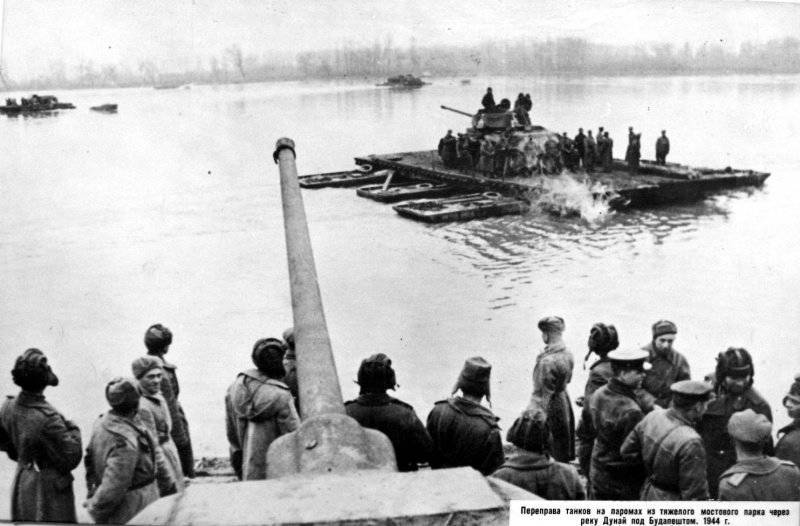
70 years ago, 29 October 1944, the strategic Budapest operation began. The fierce battle for Hungary lasted 108 days. During the operation, the troops and 2 and 3 of the Ukrainian fronts defeated 56 divisions and brigades, destroyed almost 200-thousand. enemy grouping and liberated the central regions of Hungary and its capital, Budapest. Hungary was withdrawn from World War II.
Prehistory Hungary on the road to war and World War II
Back in 1920, the authoritarian regime of Miklos Horthy was established in Hungary (Admiral Horthy Policy) Former Admiral and Commander-in-Chief of the Austro-Hungarian Navy fleet Horthy crushed the revolution in Hungary. Under Horthy, Hungary remained a kingdom, but the throne remained empty. Thus, Horthy was a regent in a kingdom without a king. He relied on conservative forces, suppressing the Communists and frankly right-wing forces. Horthy tried not to tie his hands to any political force, emphasizing patriotism, order and stability.
The country was in crisis. Hungary was not an artificial state, having long state traditions, but the defeat of the Austro-Hungarian Empire in the First World War deprived Hungary 2 / 3 of the territory (where, in addition to the Slovaks and Romanians, millions of ethnic Hungarians lived) and most of the economic infrastructure. The Trianon Treaty left an imprint on the entire post-war history Hungary (agreements between the victor countries in the First World War and the defeated Hungary). Romania received Transylvania at the expense of Hungary and part of Banat, Yugoslavia was transferred to Croatia, Backa and the western part of Banat, Czechoslovakia and Austria received Hungarian lands.
In order to channel the discontent of the people and yearning for revenge, Horthy threw all the misfortunes of Hungary on communism. Anti-communism has become one of the main ideological pillars of the Horthy regime. He was complemented by the official national-Christian ideology, which focused on the wealthy segments of the population. Therefore, in the 1920-ies Hungary did not establish relations with the USSR. The Soviet Union Horthy considered the source of the "eternal red danger" for all of humanity and opposed the establishment of any relationship with him. Revanchism was part of the ideology. Thus, on the occasion of the conclusion of the Treaty of Trianon in the Kingdom of Hungary, national mourning was declared, and all official flags were lowered down to the 1938 year. In Hungarian schools, pupils read a prayer about reunification of the homeland every day before classes.
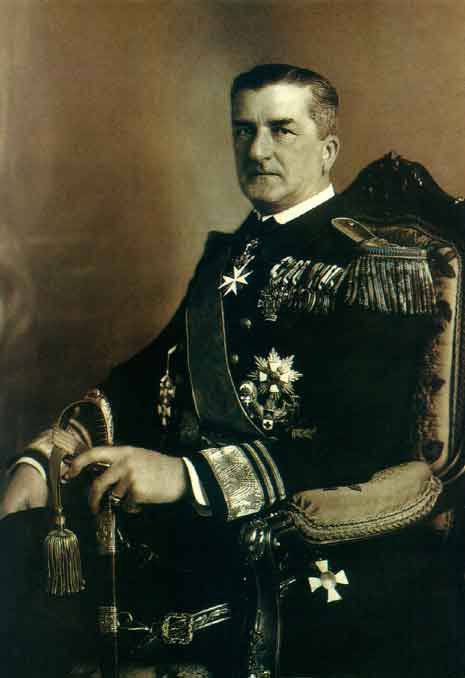
Miklós Horthy, Regent of Hungary in the 1920-1944 years
At first, Hungary focused on Italy, in 1933, relations with Germany were established. The policy of Adolf Hitler, aimed at redefining the conditions of the Versailles Agreement, was completely in keeping with Budapest. Hungary itself wanted to review the results of the First World War and advocated the abolition of the terms of the Treaty of Trianon. The hostile attitude of the “small Entente” countries, which received the Hungarian lands and were suspicious of Budapest’s attempts to reconsider the outcome of the war, and the coldness of France and England, made Hungary’s pro-Hungarian course inevitable. In the summer of 1936, Horthy visited Germany. The Hungarian leader and the German Fuhrer found understanding in terms of rapprochement and rallying forces under the banner of anti-communism. Friendship continued with Italy. When the Italians invaded Ethiopia in 1935, Hungary refused to impose restrictions on trade and economic relations with Italy, as the League of Nations demanded.
After Germany captured Austria, Horthy announced a weapons program for Hungary - the army at the beginning of 1938 had only 85 thousand people. Strengthening the country's defense was called the main task of Hungary. Hungary lifted restrictions on armed forces imposed by the Treaty of Trianon. By June, 1941 of Hungary had a strong army: three field armies and a separate mobile corps. The military industry also developed rapidly.
After this, Horthy did not see any other choice but to continue rapprochement with Hitler's Reich. In August 1938, Horthy again visited Germany. He refused to participate in the aggression against Czechoslovakia, trying to preserve the autonomy of Hungary, but was not against the solution of the territorial issue in favor of Budapest by diplomatic means.
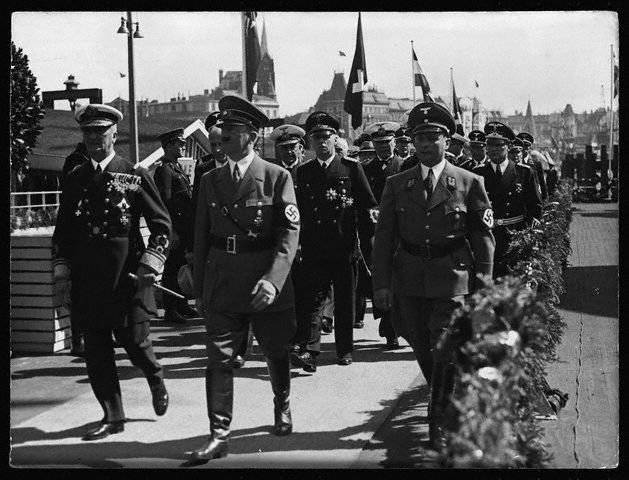
Hitler and Miklos Horthy walk along the pedestrian bridge during Horthy’s visit to Hamburg on Hitler’s 50 anniversary in 1939.
Under the terms of the Munich Treaty, September 29 1938 Prague was obliged to solve the “Hungarian issue” in accordance with the agreement with Budapest. The Hungarian government did not agree to the autonomy option of the Hungarian community within Czechoslovakia. The first Vienna Arbitration of November 2 1938, under pressure from Italy and Germany, forced Czechoslovakia to give Hungary southern regions of Slovakia (about 10 thousand km²) and southwestern regions of Subcarpathian Rus (about 2 thousand km²) with a population of more than 1 million. person. France and England did not resist this territorial repartition.
In February, 1939, Hungary joined the Anti-Comintern Pact and began an active restructuring of the economy on a war footing, sharply increasing military spending. After the occupation of all of Czechoslovakia in 1939, Subcarpathian Rus, which declared independence, was occupied by Hungarian troops. Hitler, wanting to link Hungary to Germany as closely as possible, offered Horthy the transfer of the entire territory of Slovakia in exchange for a military alliance, but was refused. Horthy chose to preserve his independence on this issue and solve the territorial issue on the ethnic principle.
At the same time, Horthy tried to continue a cautious policy, trying to maintain at least the relative independence of Hungary. Thus, the Hungarian regent refused to participate in the war with Poland and to let German troops pass through Hungarian territory. In addition, Hungary received tens of thousands of refugees from Slovakia, Poland and Romania, including Jews. After the Soviet Union regained Bessarabia and Bukovina, which Romania seized after the death of the Russian Empire, Hungary demanded that Bucharest be returned to Transylvania. Moscow supported this demand as fair. The second Vienna Arbitration from 30 in August 1940 of the year, by decision of Italy and Germany, transferred Northern Transylvania to Hungary with a total area of almost 43,5 thousand km territory with a population of about 2,5 million people. This decision was unhappy with both Hungary and Romania. Budapest wanted to get all of Transylvania, and Bucharest did not want to give anything. This territorial division caused the territorial appetites of the two powers and tied them more strongly to Germany.
Although Horthy was still trying to leave the Hungarian kingdom aside from the great European war. Thus, 3 March 1941, the Hungarian diplomats received instructions which said: “The main task of the Hungarian government in the European war until its termination is to save the military and material forces, the human resources of the country. We at all costs should prevent our involvement in a military conflict ... We should not risk the country, youth and the army in anybody’s interests, we should proceed only from our own. ” However, it was not possible to keep the country on this course, too powerful forces pushed Europe to war.
20 November 1940 of the year under pressure from Berlin Budapest signed the Tripartite Pact, joining the military alliance of Germany, Italy and Japan. Hungarian industry began to carry out German military orders. In particular, Hungary began to produce for Germany weapon. In April 1941, the Hungarian troops took part in the aggression against Yugoslavia. Hungarian Prime Minister Pal Teleki, who tried to prevent Hungary from being drawn into the war, committed suicide. In his farewell letter to Horthy, he wrote “we became perjurers”, because we could not keep the country from “acting on the side of villains”. Hungary, after the defeat of Yugoslavia, received the north of the country: Bačka (Vojvodina), Baraniu, Medjumur County and Prekmurje.
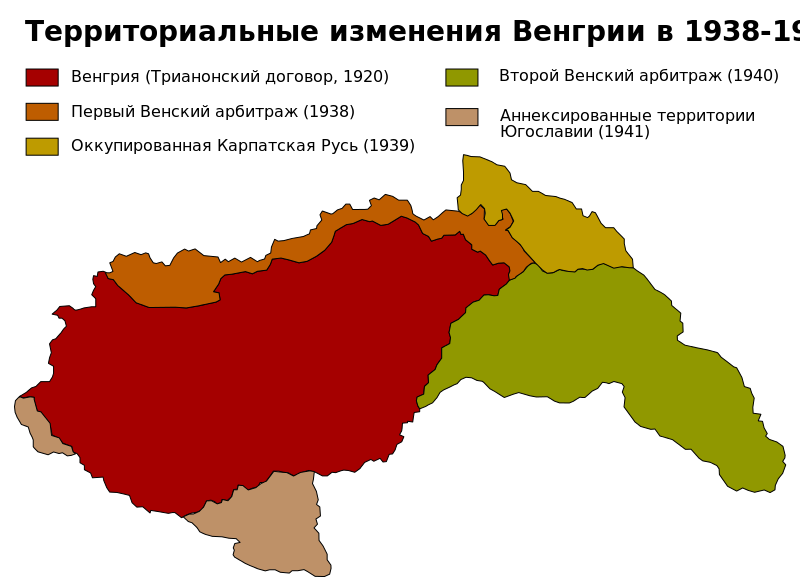
War against the USSR
Until recently, Hitler hid his plans with respect to the USSR from the Hungarian military-political leadership. Back in April, 1941, Hitler assured Horthy that the relations of Germany and the USSR were “very correct” and nothing threatened the Reich from the east. In addition, the German command was counting on a "blitzkrieg" in the east, so Hungary was not taken into account. Compared to the Wehrmacht, the Hungarian army was weak and technically poorly armed, and, as they thought in Berlin, it could not strengthen the first and decisive blow. It is also worth considering the fact that the German Führer was not sure of the complete loyalty of the Hungarian leadership and did not want to share his secret plans with him.
However, when the war began, Berlin revised its plans for the participation of Hungary in the war. Actually, part of the Hungarian leadership was also eager to take part in the carving of the “Russian bear skin”. The Hungarian National Socialist Party Crossed Arrows, although it was regularly banned, had massive support in society, including in the military environment, and demanded the country's participation in the war with the USSR. The Hungarian military, who tasted victories in the war with Yugoslavia and who were impressed by the military successes of the Wehrmacht in Europe, demanded to take part in the war. In the spring of 1941, the head of the Hungarian General Staff, General Henrik Vert, demanded both Regent Horthy and Prime Minister Laslo Bardosi to put a question to Germany about the indispensable participation of the Hungarian army in the “crusade” against the Soviet Union. But Horthy waited, as did the government.
Hungary entered the war after the incident of June 26, 1941, when unknown bombers attacked the Hungarian city of Kosice. According to one version, the Soviet aviation made a mistake and had to bomb the Slovak city of Presov (Slovakia entered the war with the USSR on June 23), or the Soviet command did not doubt the future choice of Hungary, a random blow is possible, due to the chaos in command and control of troops at the beginning of the war. According to another version, the provocation was organized by the Germans or Romanians in order to drag Hungary into the war. On the same day, a proposal was submitted to the General Staff of the Hungarian Army from the German High Command to join the war against the Union. As a result, Hungary declared war on the USSR. Hungary has opened its territory for the transit of military materials from Germany and Italy. In addition, during the war the Kingdom of Hungary became the agrarian base of the Third Reich.
In late June - early July 1941, the Carpathian Group was sent to the Eastern Front: the 8-th Kosice Corps (1-I Mountain and 8-I Border Brigade) under the command of Lieutenant-General Ferenc Szombathely and the Mobile Corps (two motorized and one cavalry brigade) under the command of General Bela Miklos. Hungarian troops were attached to the 17 of the German army as part of Army Group South. In early July, the Hungarian soldiers fought with the 12-th Soviet army. Then the Hungarian troops took part in the battle of Uman.
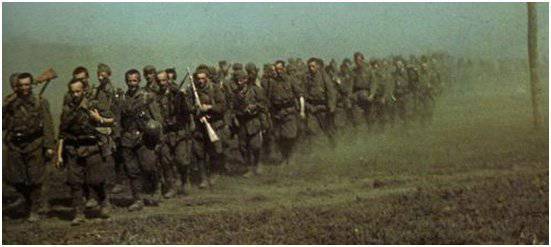
Hungarian troops in the Don steppes, summer 1942 of the year
In September, several more Hungarian divisions were deployed in the USSR 1941. They were used to protect communications and to fight partisan formations in Ukraine, in the Smolensk and Bryansk regions. It must be said that the Hungarians “distinguished themselves” by a series of atrocities in Chernihiv, Bryansk and near Voronezh, where Hungarian soldiers thanked the “god” that they could participate in the destruction of “Slavic and Jewish contagion” and killed old people, women and children without pity. In similar atrocities, Hungarians were noted in the occupied lands of Yugoslavia. In the Serbian Vojvodina, soldiers of the Szeged Corps of General Fekethalmi (the future head of the Hungarian Army General Staff) committed a massacre. Serbs and Jews were not even shot, but drowned in the Danube and chopped with axes.
Therefore, a monument to Hungarian soldiers, who built on Voronezh land in the village of Rudkino, as well as memorial burials to foreign locators in other villages of Voronezh land, where Hungarians-Magyars were most outraged, is a real blasphemy over the memory of Soviet soldiers, a betrayal of Russian civilization. This is the gradual introduction of hostile programs of political tolerance and political correctness.
By the beginning of 1942, the number of Hungarian soldiers in the USSR increased to 200 thousand people, the 2-I Hungarian army was formed. Soon the Hungarians paid for their atrocities. During the Soviet counteroffensive during the Battle of Stalingrad, the Hungarian army was almost destroyed. The Hungarian army lost 145 thousand killed and captured (most of the destroyed, like mad dogs, our ancestors with evil spirits did not stand on ceremony) and most of the weapons and equipment. 2-I Hungarian army almost ceased to exist as a combat unit.
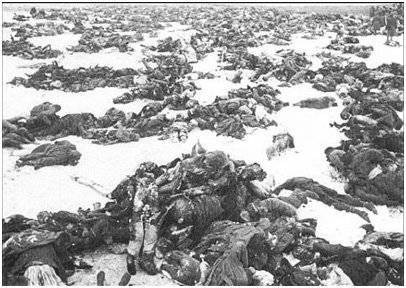
Hungarian soldiers killed near Stalingrad
After that, Adolf Hitler did not put the Hungarian troops at the forefront for a long time, the Hungarians were now carrying out logistical tasks in Ukraine. Horthy, concerned about the fate of Hungary, replaced the government of Bardosi with the government of Kallai. Miklos Kallai continued the policy of supplying Germany with everything necessary, but at the same time the Hungarians began to seek contacts with the Western powers. So, Budapest pledged not to fire Anglo-American airplanes over Hungary. In the future, the Hungarian government promised to go over to the side of the anti-Hitler coalition, after the invasion of the Western powers into the Balkans. At the same time, Budapest refused to negotiate with the USSR. In addition, the Hungarians forged contacts with the emigre governments of Poland and Czechoslovakia, trying to preserve the pre-war territorial acquisitions. Negotiations were conducted with Slovakia, which also had to go over to the side of the Anti-Hitler coalition, after Hungary went over to the side of England and the USA.
Hungary's attempt to withdraw from the war
In 1944, the situation escalated dramatically. The Wehrmacht and the Romanian army suffered severe defeats in the southern strategic direction. Hitler demanded that Horthy carry out a total mobilization. In Hungary, the 3 Army was formed. But Horthy was still bending his line, for him the inevitability of the defeat of Germany, and therefore of Hungary, was already obvious. The internal situation of the country was characterized by the growth of economic difficulties and social tensions, the growth of the influence of radical pro-German forces.
Hitler, doubting the reliability of Budapest, forced Horthy in March 1944 to agree to the entry of Hungary into the German troops, and with them the SS troops. In Hungary, the pro-German government, Deme Stand, was established. When the anti-German coup took place in Romania on August 23 and Romania took the side of the anti-Hitler coalition, the situation for Hungary became critical. 30 August - 3 October 1944 The troops of the USSR and Romania carried out against the Wehrmacht and the Hungarian army the Bucharest-Arad operation (the Romanian operation). In the course of this operation, almost the whole of Romania was liberated from the German-Hungarian forces and the Red Army occupied the initial areas for an offensive in Hungary and Yugoslavia. In September 1944, the Soviet troops crossed the border of Hungary. Later in the course of the East Carpathian operation (Ninth Stalinist strike: East Carpathian operation) 1-I Hungarian army suffered heavy losses, was essentially defeated.
On the basis of military defeats in Hungary, a government crisis occurred. Horthy and his entourage tried to gain time and prevent the entry of Soviet troops in Hungary in order to preserve the political regime in the country. Horthy dismissed the pro-German government of the Stand and appointed General Geza Lakatosh as Prime Minister. The military government of Lakatos was opposed to Germany and tried to preserve the former Hungary. At the same time, Horthy attempted to continue negotiations with Britain and the United States on the conclusion of an armistice. However, the solution of this question could not have been without the participation of the USSR. 1 October 1944 The Hungarian mission was forced to arrive in Moscow. Hungarian envoys had the authority to conclude a truce with Moscow if the Soviet government agreed to the participation of the Anglo-American troops in the occupation of Hungary and to the free evacuation of the Wehrmacht from Hungarian territory.
October 15 1944, the Hungarian government announced a truce with the USSR. However, Horthy, unlike the Romanian King Mihai I, could not bring his country out of the war. Hitler was able to save Hungary. The Fuhrer was not going to lose his last ally in Europe. Hungary and East Austria were of great military strategic importance. It housed a large number of military factories and there were two significant sources of oil, in which the German armed forces were in dire need. The SS detachment stole in Budapest and took Horthy’s son, Miklos (Junior) Horthy, hostage. The operation was conducted by the famous German saboteur Otto Skorzeny (Operation Faustpatron). Under the threat of depriving his son of life, the Hungarian regent abdicated and handed over power to the pro-German government of Ferenc Salash. The power was received by the leader of the Nazi party "Crossed Arrows" and Hungary continued the war on the side of Germany.
In addition, the Fuhrer sent large armored formations to the Budapest area. In Hungary, a powerful group was deployed - Army Group South (German 8 and 6 Armies, Hungarian 2 and Army 3) under the command of Johannes (Hans) Frisner and part of the forces of Army Group F.
Admiral Horthy was sent to Germany, where he was kept under house arrest. His son was sent to the camp. Part of the Hungarian military, led by the commander of the 1 of the Hungarian army, General Bela Miklos, went over to the side of the Red Army. Miklos turned on the radio with an appeal to the Hungarian officers on the transition to the side of the USSR. In the future, the commander will head the Provisional Hungarian Government. In addition, the formation of the Hungarian units in the Red Army will begin. However, the majority of the Hungarian army will continue the war on the side of Germany. Hungarian troops will actively oppose the Red Army during the Debrecen, Budapest and Balaton operations.
The 2-I of the Hungarian army will be defeated during the Debrecen operation, its remnants will be included in the 3-I army. Most of the Hungarian 1 will be destroyed during heavy fighting at the start of the 1945 of the year. Most of the remnants of the 3 of the Hungarian army will be destroyed in 50 km west of Budapest in March 1945. The remnants of the Hungarian units fighting on the German side will retreat to Austria and surrender only in April - early May 1945 on the outskirts of Vienna.
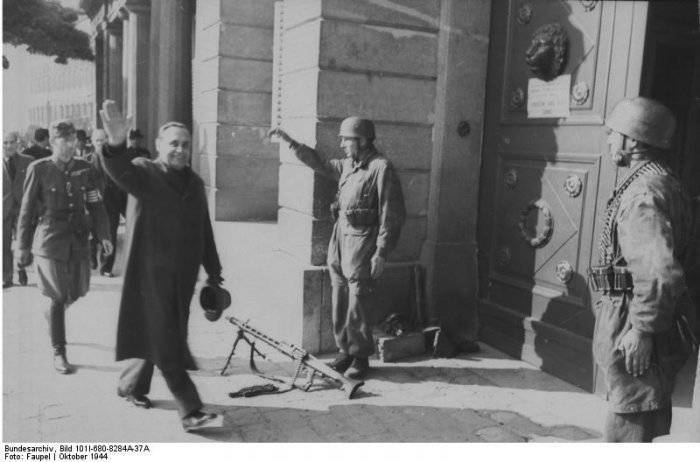
Ferenc Salash in Budapest. October 1944 of the year
To be continued ...
Information